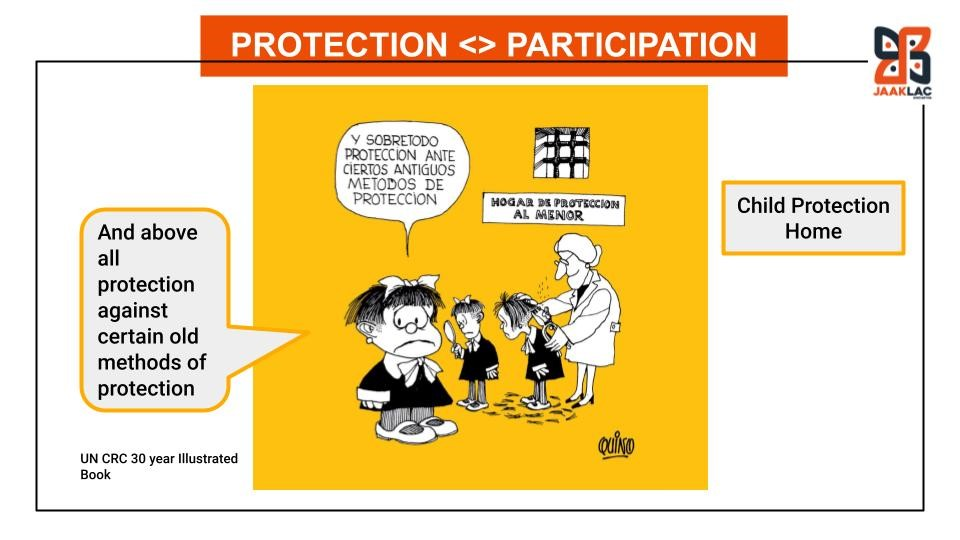The workshop was built upon scholarly work defining ‘digital education’ as the teaching and learning with and about digital technologies (Bayne and Ross, 2011). JAAKLAC brings a fresh approach proposing rights-based critical digital education fostering to champion comprehensive and internationally coordinated policies, and including children’s participation in matters that affect them. Children are defined as individuals under the age of 18, following the United Nations’ (UN) Convention of the Rights of the Child (CRC).
The focus of JAAKLAC iniciativa hinges upon the digital ecosystem increasingly intersecting with a wide array of fundamental rights and the significant representation of children online. However, the swift push for a digital transformation of society has not been equally balanced globally with an education encompassing digital development with human rights. The digital education has been broadly concentrated on teaching with digital technologies and developing skills for the labour market (Law, Woo, de la Torre et al, 2018). This deficit has had severe consequences for the rights of freedom of expression, protection and privacy (OHCHR, 2018; UN GA, 2020).
In this light, the MozFest workshop was designed to welcome youth and adults to engage in discussing together issues of data protection policies. The activity introduced participants to the increasing ‘datafication’ of human experience (Beer, 2018), data protection and privacy policies, its relations with human rights and problems of excluding children’s voices from these discussions. A role play activity was conducted for participants to propose a solution in a case scenario from Uruguay (Magnone, 2020). For the exercise they were divided into groups having to represent the standpoints of students, families, government and tech companies.
Around 20 participants engaged in a prototyping of a multi-stakeholder data protection policy discussion. These are some of the key findings and lessons learned from the experience:
The participants’ background diversity had the common thread of being mainly adults, knowledgeable of the field, highly concerned about their online privacy and aware of the staggering market value of personal data, as one participant pointed: “Data is the current currency”.
The workshop’s interactive dimension was positively highlighted by participants. Their main policy recommendations included minimising children’s data collected, supporting parents and educators in determining which digital platforms were more adequate and implementing solutions that were inclusive of all viewpoints on these matters.
Children’s absence was a great limitation for adults to understand youngsters’ varying experiences and interests. The role play policy recommendations from the students' representative group were mostly narrowed to childern’s need of being aware on these issues.
In relation to the latter, Marielos, our 17 years old facilitator, reflected after the session that she was struck by how children were portrayed as indifferent about their online privacy: “as a person who has done activism for a long time in her life and is now talking about it, these issues are of high importance” (…) “I think youth are interested in it even beyond what they’re doing”, expressed Marielos.
Marielos is a member of the Red Concausa, a youth Latin American network who was part of the creation of Digital Causes (Causas Digitales), a UN CRC online project from JAAKLAC which had been previously dismissed by adult-led organizations. This showcases the significance of including children and adolescents' participation in the decision-making processes to nurture a global citizenship with the abilities and knowledge to discuss and co create a fairer digital future.

The slides used in the excersice can be accessed here
About the Author: Soledad Magnone is a Uruguayan sociologist focused for more than 10 years on the intersections between education, digital technologies and human rights and she is the promoter of JAAKLAC iniciativa.
References:
Bayne S and Ross J (2011) ‘Digital native’ and ‘digital immigrant’ discourses. A critique. In: Land R and Bayne S (eds) Digital difference: Perspectives on online learning. Rotterdam: Sense, pp.159-169.
Beer D (2018) The data gaze: Capitalism, power and perception. Sage.
Law N, Woo D, de la Torre J and Wong G (2018) A global framework of reference on digital literacy skills for indicator 4.4.2. UNESCO Institute for Statistics (UIS/2018/ICT/IP/51).
Magnone S (2020) Challenges and opportunities for minors’ data protection legislation in Uruguay: their rights, the future of our democracy. In: JAAKLAC iniciativa – blog. Available at: https://jaaklac.org/blog/data-protection-uruguay/ (accessed on 23rd March 2021).
UN GA (2020) Road map for digital cooperation: implementation of the recommendations of the High-level Panel on Digital Cooperation. Report of the Secretary-General A/74/821, 29 May. Available at: https://www.un.org/en/content/digital-cooperation-roadmap/ (accessed 25th March 2021).
UN OHCHR (2018) The right to privacy in the digital age. Report of the United Nations High Commissioner for Human Rights A/HRC/39/29, 3 August. Available at: https://undocs.org/A/HRC/39/29 (accessed 25th March 2021).